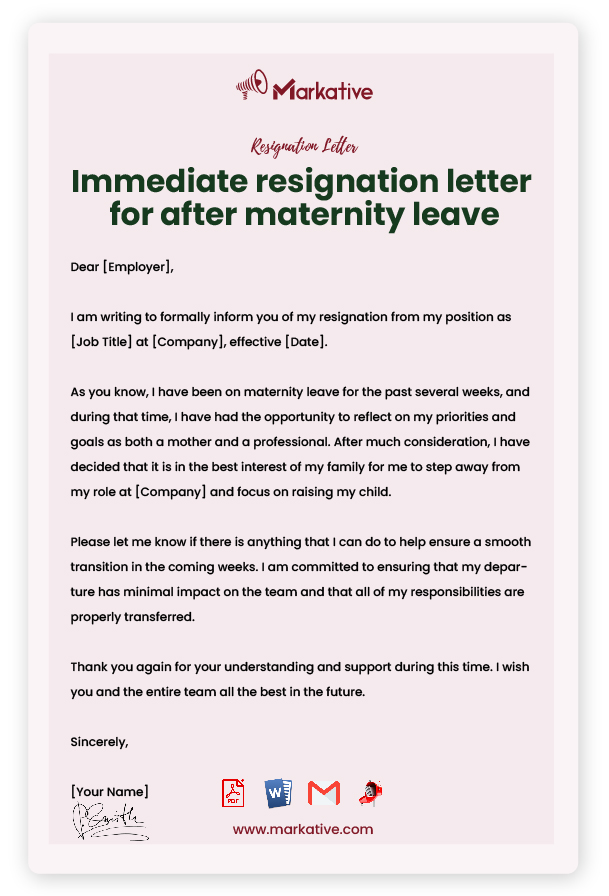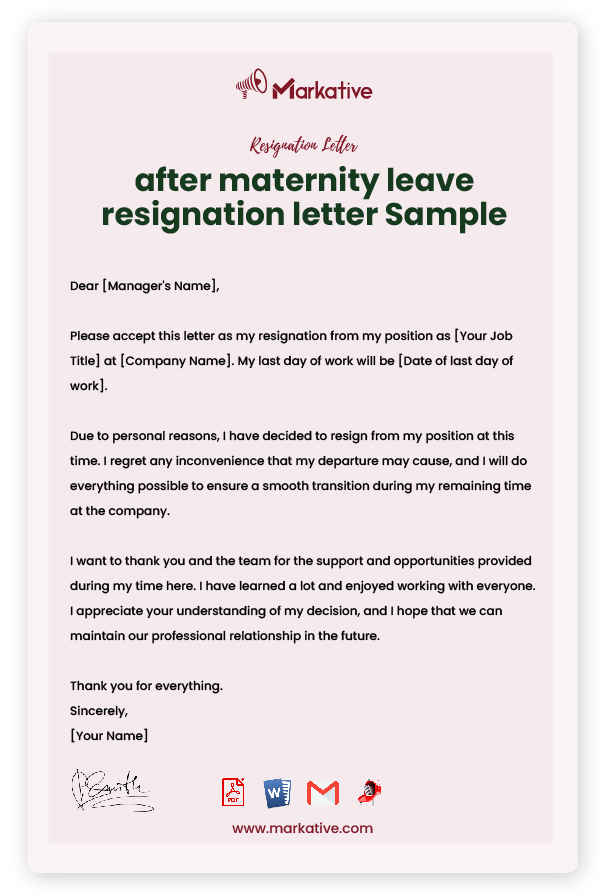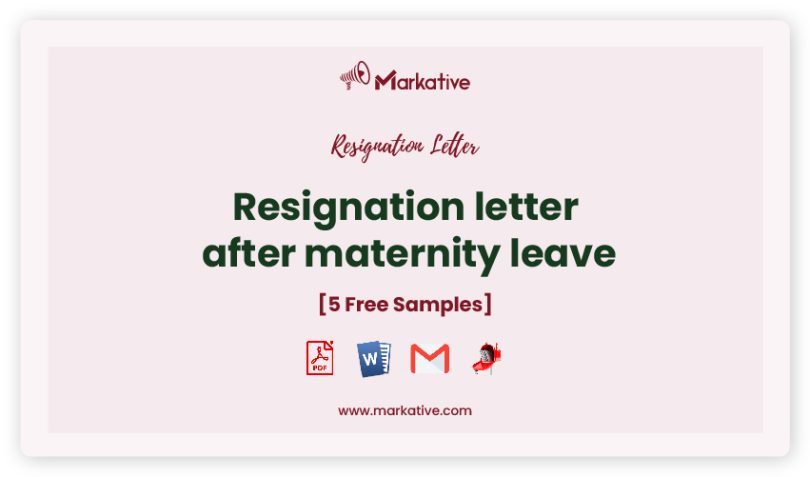Resignation is a significant part of any professional’s career journey, and writing a resignation letter is an essential step towards leaving a job. It is even more important for working mothers who are returning to work after a maternity leave. A resignation letter after maternity leave is necessary as it marks the end of a significant period of time in a working mother’s life and paves the way for the next chapter. It’s important to approach the resignation process thoughtfully, to ensure that you leave on a positive note with your employer and colleagues.
A well-written resignation letter creates an impact that lasts long after you’ve left the job. It reflects your professionalism, maturity, and gratitude towards your employer and colleagues. A good resignation letter shows that you’ve taken the time to consider the impact of your departure on your team and the company. It helps you to leave with your reputation and relationships intact, which is essential for your future career prospects. Additionally, a good resignation letter can also help to build bridges and networks for the future.
In this article, we will discuss the importance of writing a resignation letter after maternity leave. We will also provide tips and guidance on how to craft a good resignation letter that creates an impact. Whether you’re leaving your job to focus on your family or starting a new venture, resigning on a positive note can help you move forward with confidence. So, let’s dive in and explore the key elements of a good resignation letter after maternity leave.
How To Write Appealing Resignation Letter After Maternity Leave?
Resigning from a job after maternity leave can be a tough decision, but when it’s time to move on, it’s important to do so professionally. Writing an appealing resignation letter can help you leave a positive impression and maintain good relationships with your employer.
Here are the 5 steps on how to write an appealing resignation letter after maternity leave:
- Start with a clear statement of resignation: Begin your letter by stating clearly and succinctly that you are resigning from your position. Mention the date of your resignation and give adequate notice period as per company policy.
Example: “Please accept this letter as my formal resignation from my position as Marketing Manager at ABC Company. My last day of work will be April 30, 2023, in compliance with the two-week notice period outlined in my contract.”
- Express gratitude: It’s important to express gratitude to your employer and colleagues for the opportunities and support provided during your tenure. Be specific about the aspects of your job that you appreciated the most.
Example: “I want to express my sincere gratitude to you and the entire team at ABC Company for the support, guidance, and opportunities provided during my time here. It has been a pleasure working with such a dedicated and talented group of professionals.”
- Provide a reason for resignation: If you feel comfortable sharing the reason behind your resignation, briefly mention it in your letter. This can help your employer understand your decision and make the transition smoother.
Example: “After careful consideration, I have decided to resign from my position to focus on my family and the new responsibilities that come with being a new mother.”
- Offer to help with the transition: If you are willing to help with the transition, mention it in your letter. This can help show that you are committed to leaving on good terms and that you value your employer.
Example: “I am committed to ensuring a smooth transition for the marketing team and am willing to assist in any way possible to ensure that the transition is seamless.”
- End on a positive note: End your letter by thanking your employer once again and expressing your best wishes for the company’s future success.
Example: “I wish you and the team at ABC Company all the best for the future, and I am confident that the company will continue to thrive and achieve great success in the years to come.”
Conclusion: Writing an appealing resignation letter after maternity leave is an important step in transitioning out of your job. By following these steps and providing a clear and positive message, you can leave on good terms and maintain positive relationships with your employer and colleagues.
For More: How To Write Good Resigning from Work due to Childcare [5 Free Samples]

Resignation Letter After Maternity Leave with Notice Period
Dear [Manager's Name], I am writing to inform you that I have decided to resign from my position at [Company Name]. My last working day will be [Date], which is [Notice Period] days from the date of this letter. I have thoroughly enjoyed my time at [Company Name], and I appreciate the support and opportunities provided to me during my tenure. However, after careful consideration, I have decided to prioritize my family and focus on raising my newborn child. I would like to thank you and the entire team for the wonderful experience and memories. I am grateful for the guidance and mentorship provided by you and my colleagues, which has helped me grow both professionally and personally. Please let me know if there is anything I can do to ensure a smooth transition during my notice period. I will do my best to complete any pending tasks and assist in the handover of my responsibilities. Thank you for your understanding and cooperation. I wish the company continued success in the future. Sincerely, [Your Name]
Resignation Letter After Maternity Leave without Notice Period
Dear [Manager's Name], I am writing to inform you that I have decided to resign from my position as [Your Job Title] effective immediately. As you are aware, I have been on maternity leave for the past [insert duration], and during that time, I have had the opportunity to reflect on my personal and professional goals. After careful consideration, I have decided that it is in my best interest to resign from my position and focus on my family and personal life. Unfortunately, due to unforeseen circumstances, I will not be able to provide the customary notice period of [insert notice period] before leaving. I apologize for any inconvenience this may cause and appreciate your understanding. I would like to express my gratitude for the opportunities provided to me during my time at [Company Name]. I have learned a great deal and am grateful for the support and encouragement I received during my tenure. Please let me know if there are any further steps I need to take to ensure a smooth transition, and if there are any outstanding tasks that require my attention. Thank you again for your understanding, and I wish the company continued success. Sincerely, [Your Name]
Resignation Letter After Maternity Leave with Reason
Dear [Manager's Name], Please accept this letter as formal notice of my resignation from [Company Name], effective [Date of Resignation]. It has been an honor to work with such a dedicated and talented team, but I have decided that it is best for me to step down from my role and focus on my family. As you know, I have recently returned from my maternity leave, and during my time away, I had the opportunity to reflect on my priorities and goals. While I have thoroughly enjoyed my time at [Company Name] and have appreciated the support that the organization has provided to me throughout my pregnancy and maternity leave, I have come to the conclusion that I need to prioritize my family at this time. As a new mother, I have found that balancing the demands of work and family life can be challenging, and I want to be fully present for my child during these formative years. After careful consideration, I have decided that resigning from my position is the best decision for me and my family at this time. I would like to thank you and the rest of the team for the support and encouragement that you have provided to me over the years. I am grateful for the opportunities that I have had to learn and grow professionally, and I will always treasure the relationships that I have built with my colleagues. I will do everything in my power to ensure a smooth and seamless transition, and I am committed to working with you and the rest of the team to tie up any loose ends and transfer my responsibilities to a qualified successor. Thank you again for your understanding and support during this transitional period. I wish the company and the team continued success in the future. Sincerely, [Your Name]
Resignation Letter After Maternity Leave without Reason
Dear [Manager's Name], I am writing to formally submit my resignation from my position at [Company Name]. My last day of work will be [Date]. I want to express my appreciation for the opportunities and experiences I gained while working at this company. I appreciate the support I received during my maternity leave, and I am grateful for the understanding shown by my colleagues during my absence. I understand that my decision may come as a surprise, but after much consideration, I have decided to pursue other opportunities that are more aligned with my personal and professional goals. I apologize for any inconvenience this may cause and will do everything in my power to ensure a smooth transition during my remaining time here. Thank you again for everything, and I wish you and the company all the best in the future. Sincerely, [Your Name]
Urgent Resignation Letter After Maternity Leave Sample
Dear [Manager's Name], I am writing to inform you of my resignation from [Company Name], effective immediately. It is with a heavy heart that I make this decision, but I have decided to focus on my family and personal obligations after my maternity leave. I would like to express my gratitude for the opportunities that I have been given during my time here. The support and encouragement that I received from my colleagues and superiors have been invaluable in my professional growth. Please let me know if there are any further steps I need to take to ensure a smooth transition. I will do my best to assist in the handover of my responsibilities. Thank you for your understanding and support during this time. Sincerely, [Your Name]
How Much Notice Should You Give for a Resignation Letter After Maternity Leave?
According to the U.S. Bureau of Labor Statistics, the average employee tenure in the United States is currently 4.2 years. However, this varies widely by industry, with some sectors such as education and healthcare experiencing longer average tenures, while others such as retail and hospitality have shorter tenures. Additionally, the average tenure tends to increase with age, with older workers tending to have longer tenures than younger workers.
If you are returning to work after maternity leave and planning to resign, it is important to provide your employer with ample notice to ensure a smooth transition. While there is no specific legal requirement for how much notice you should give, a good rule of thumb is to provide at least two weeks’ notice.
However, if you have a more senior position or work in a specialized field, it may be appropriate to provide more notice to allow your employer sufficient time to find a replacement or make other arrangements. Ultimately, the amount of notice you give will depend on your individual circumstances and the relationship you have with your employer.
Is it Ok To Email a Resignation Letter After Maternity Leave?
Yes, it is generally acceptable to email a resignation letter after maternity leave. However, it is recommended to also have a face-to-face or phone conversation with your employer or supervisor to discuss the resignation and any outstanding work or projects. In the email, be professional and concise, thanking the company for the opportunities and experiences gained while working there. Here is an example:
Dear [Manager's Name], I hope this email finds you well. I am writing to inform you that I have decided to resign from my position at [Company Name] effective immediately. It was a difficult decision, but I have decided to focus on my family and personal obligations. I would like to express my gratitude for the opportunities and experiences I have gained while working with such a talented and supportive team. Thank you for your guidance and mentorship throughout my time at [Company Name]. Please let me know how I can assist with the transition process and any outstanding work or projects. I am happy to help in any way I can. Thank you again for everything. Best regards, [Your Name]

Common Mistakes When Writing a Resignation Letter After Maternity Leave?
- Not giving enough notice: One common mistake when writing a resignation letter after maternity leave is not giving enough notice. Make sure to check your company’s policy on notice periods and provide ample time for your employer to find a replacement for your position.
- Failing to express gratitude: It’s important to express gratitude to your employer and colleagues for the opportunities and support they’ve given you during your time at the company. A simple thank you note can go a long way in maintaining positive relationships.
- Not being clear about your reasons for leaving: While you don’t have to go into detail about your personal reasons for leaving, it’s important to be clear and professional about your decision to resign. State your reasons briefly and focus on your future plans and goals.
For Reading: How To Write Resignation letter for personal reasons [5 Free Samples]
Conclusion:
Writing a resignation letter after maternity leave is a significant decision that requires careful thought and planning. It is essential to follow the proper resignation protocol, including when and where to send your letter, to ensure a smooth transition for both you and your employer. Common mistakes, such as being too emotional or providing too much information, should be avoided to maintain a professional tone.
However, it is possible to make this process easier by using free and ready-to-use resignation letter templates. These templates can guide you on the proper formatting and content of a resignation letter, allowing you to focus on the next chapter of your life. Remember, resigning from a job is never easy, but by following the right steps and using the proper resources, you can make the transition as smooth as possible.







